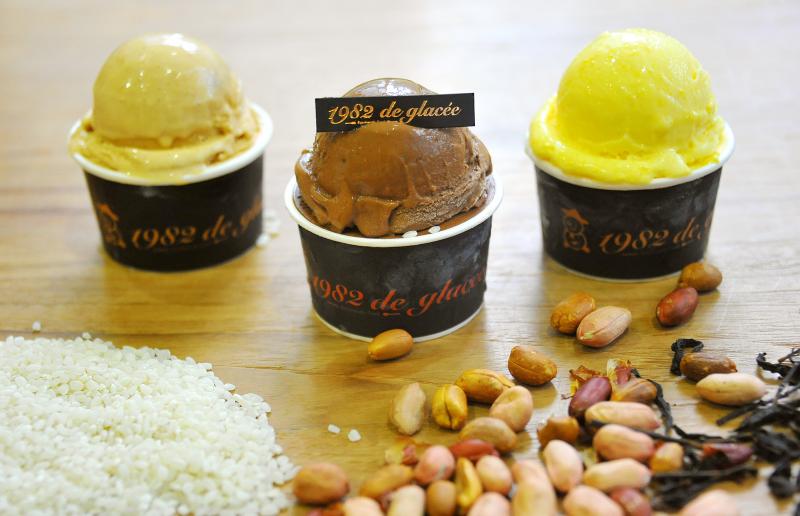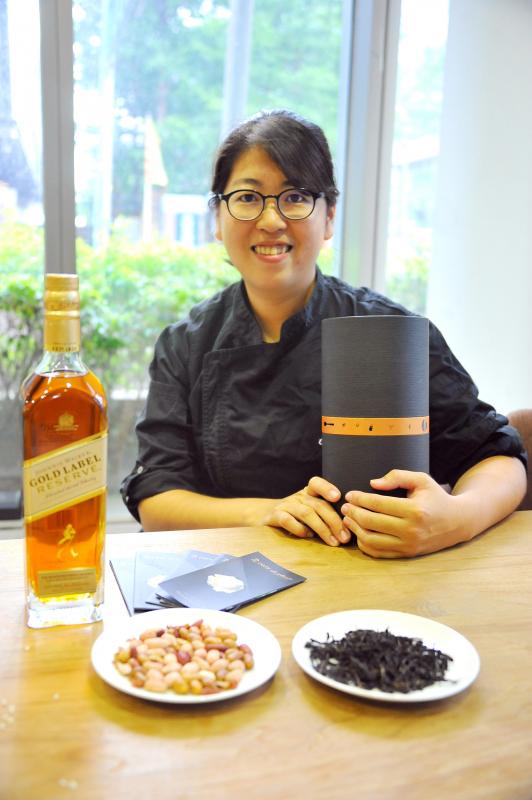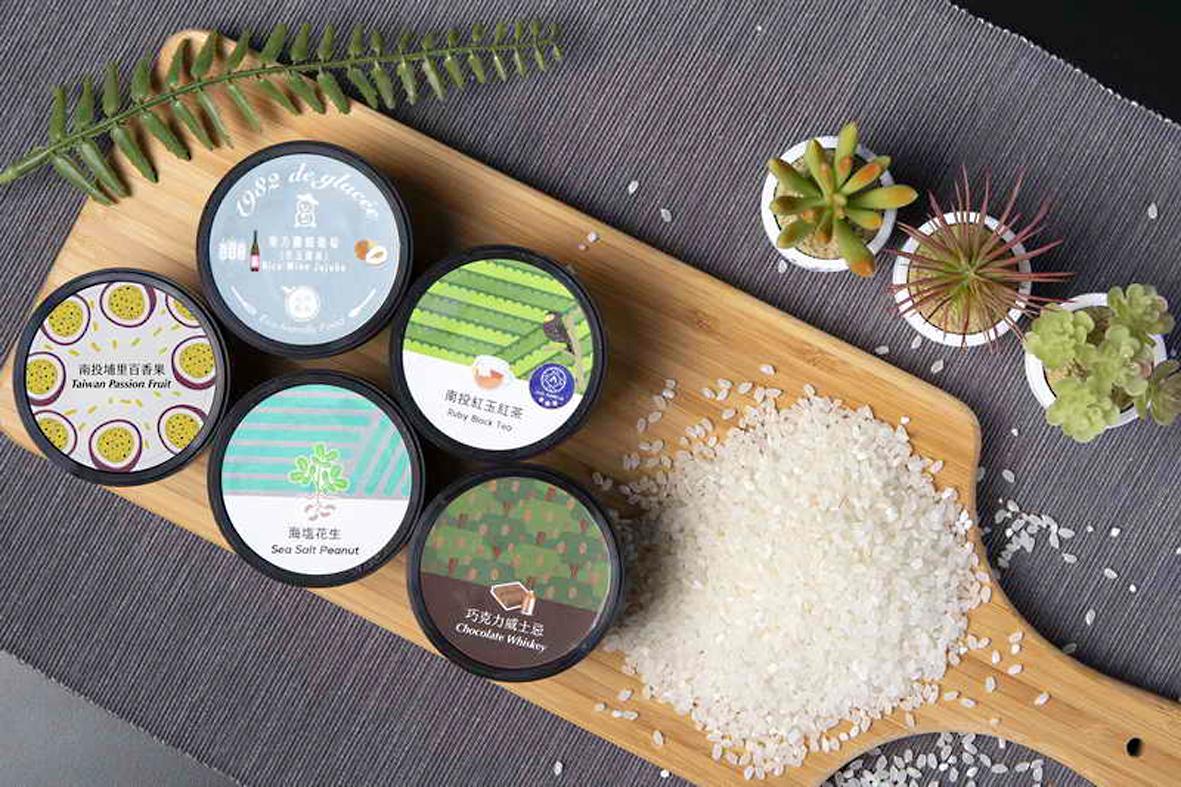It can take ice cream maker Miky Wu (吳書瑀) months to create a new flavor. In addition to using only eco-friendly and organic ingredients, her brand 1982 de glacee also eschews artificial additives, replacing emulsifiers and stabilizers with Taiwanese rice and wood ear derivatives.
Wu’s non-traditional methods and dedication to capturing the essence of the main ingredient can lead to hours and hours tinkering in her “research office” in Tainan, even referencing academic papers to get the science correct. Her efforts were recently recognized for the third year in a row by the prestigious A. A. Taste Awards run by the global Anti-Additive Association.
“People keep asking about new flavors, but we take our time,” Wu says. “The secret to our success is that we have to completely understand the ingredients first.”

Photo: Han Cheung, TAipei TImes
One of Wu’s long-time collaborators is Hsu You-jen (許又仁) of Yuan Pei Farm (元沛農坊), who uses scientific methods to practice and promote sustainable and organic agriculture. Hsu provides the rice used in Wu’s French-style ice cream and the two often brainstorm on flavors using ingredients sourced through Hsu’s network of farmers who share Yuan Pei’s ideals.
1982 de glacee won its first A. A. Taste award in 2018 with a black tea collaboration with Hsu, and their latest product using Johnnie Walker Gold Label whisky and fair trade Peruvian chocolate again made the list this year, along with Wu’s Nantou passion fruit creation.
Each of 1982 de glacee’s 30-odd flavors tells an environmental story, and Wu says that through the chocolate she wanted to highlight the importance of fair trade and support eco-friendly cacao farmers.

Photo: Han Cheung, Taipei Times
Hsu is a two-time recipient of the Keep Walking Fund run by Johnnie Walker’s parent company Diageo, which has supported over 180 socially conscious entrepreneurs in Taiwan since 2003.
Wu hopes that through partnering with a well-known brand, they can together make their efforts and Taiwanese agriculture more visible on the international stage.
FRUITFUL PARTNERSHIP

Photo courtesy of 1982 de glacee
Wu and Hsu both entered the food industry from completely different fields: Wu was an accountant and Hsu had earned his PhD in nanotechnology from National Tsinghua University.
The granddaughter of a traditional ice cream vendor, Wu decided to take up the family mantle in 2011 with the idea of using delicious and healthy products to promote consumer awareness of the environment, sustainability and food safety.
With support from the Keep Walking Fund, Hsu founded Yuan Pei in 2014, where he first focused on reducing agricultural and food waste. Later, he began applying the Internet of Things and nanotechnology to develop sustainable methods to monitor the quality and standard of his farm’s products.
“We see a lot of issues in society, and we see many people trying to solve them,” Diageo senior corporate relations manager Sam Sheu (許鴻鵬) says. “Our role is to help them do it faster, which helps our overall environment and ultimately benefits us. We provide the platform and exposure so they can fully focus on developing their projects.”
Sheu says that part of the support includes connecting their entrepreneurs with industry players to form new ecosystems that open up new avenues to solving Taiwan’s problems. Hsu works with food producers like Wu to uncover more possibilities for the nation’s agriculture industry.
“After the first three or four years, I found that I needed professional help from the agricultural side,” Wu says. “Hsu and I share similar ideals, but he’s on the production side while I’m on the processing end. We started entering competitions together to promote our efforts since there are more food product awards than agricultural ones.”
KEEP EXPERIMENTING
The environmentally-friendly rice Wu uses in all her ice cream varieties is one of Hsu’s signature products. After winning her first A. A. Taste award, Wu followed up with a sea salt peanut flavor and a rum raisin-inspired rice wine and dried jujube concoction — which she says has been her most challenging project so far.
“We took apart ingredients that appear in local dishes and reconstructed them in ice cream,” Wu says. “It’s familiar to people, but they can’t put their finger on it. It overturns the way people look at ingredients.”
After coming up with the concept, Wu had to get down to the science of preserving the alcohol taste without ruining the ice cream’s texture. This would be easy using emulsifiers and stabilizers, she says.
“We found out how alcohol changes the melting point of the ice cream, isolated the factors and devised methods of controlling it,” Wu says.
Acidity also affects the texture of the ice cream, Wu says, which was the main challenge while making the passion fruit flavor. Wu says generally, ice cream makers refrain from using too much real fruit to preserve the texture, but she wanted to fully capture the passion fruit’s distinct aroma and taste. She tinkered until she found a way to keep both.
“This year’s passion fruit crop will also be different from last year’s,” she adds. “So we are constantly making adjustments.”
As Wu’s network expands, she says farmers like to offer unusual products to tinker with. She’s even created a savory ice cream using edamame beans, seasoned with black pepper and olive oil.
Since Taiwan suffers from overproduction of rice, Wu is working with Hsu to develop a gluten-free, all-rice ice cream cone. And in recent years, she’s also been coming up with ways to add color to the ice cream using whole ingredients such as dragonfruit.
Wu says that despite Taiwan setting its sights on Industry 4.0, much of its food industry still relies on traditional methods. She hopes that through the advancements in food technology, production of additive-free, eco-conscious food can become easier and eventually become the norm.
“There’s a lot of factors that need to be considered,” she says. “That’s why we need to do more research on more ingredients on a more fundamental level.”
For more information, visit www.eco1982.com.
WARNING: Excessive consumption of alcohol can damage your health.

Google unveiled an artificial intelligence tool Wednesday that its scientists said would help unravel the mysteries of the human genome — and could one day lead to new treatments for diseases. The deep learning model AlphaGenome was hailed by outside researchers as a “breakthrough” that would let scientists study and even simulate the roots of difficult-to-treat genetic diseases. While the first complete map of the human genome in 2003 “gave us the book of life, reading it remained a challenge,” Pushmeet Kohli, vice president of research at Google DeepMind, told journalists. “We have the text,” he said, which is a sequence of

On a harsh winter afternoon last month, 2,000 protesters marched and chanted slogans such as “CCP out” and “Korea for Koreans” in Seoul’s popular Gangnam District. Participants — mostly students — wore caps printed with the Chinese characters for “exterminate communism” (滅共) and held banners reading “Heaven will destroy the Chinese Communist Party” (天滅中共). During the march, Park Jun-young, the leader of the protest organizer “Free University,” a conservative youth movement, who was on a hunger strike, collapsed after delivering a speech in sub-zero temperatures and was later hospitalized. Several protesters shaved their heads at the end of the demonstration. A

Every now and then, even hardcore hikers like to sleep in, leave the heavy gear at home and just enjoy a relaxed half-day stroll in the mountains: no cold, no steep uphills, no pressure to walk a certain distance in a day. In the winter, the mild climate and lower elevations of the forests in Taiwan’s far south offer a number of easy escapes like this. A prime example is the river above Mudan Reservoir (牡丹水庫): with shallow water, gentle current, abundant wildlife and a complete lack of tourists, this walk is accessible to nearly everyone but still feels quite remote.

In August of 1949 American journalist Darrell Berrigan toured occupied Formosa and on Aug. 13 published “Should We Grab Formosa?” in the Saturday Evening Post. Berrigan, cataloguing the numerous horrors of corruption and looting the occupying Republic of China (ROC) was inflicting on the locals, advocated outright annexation of Taiwan by the US. He contended the islanders would welcome that. Berrigan also observed that the islanders were planning another revolt, and wrote of their “island nationalism.” The US position on Taiwan was well known there, and islanders, he said, had told him of US official statements that Taiwan had not